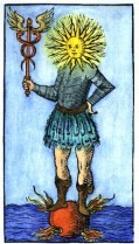“A man who has not passed through the inferno of his passions has never overcome them. They then dwell in the house next door, and at any moment a flame may dart out and set fire to his own house. Whenever we give up, leave behind, and forget too much, there is always the danger that the things we have neglected will return with added force.” -C.G. Jung, Memories, Dreams, Reflections, p. 307.
This is a common theme in Jung–the return of the neglected with added force. He even has a fancy name for it, enantiodromia. The quote above occurs in a section where Jung is discussing his travels to India and his reactions and reflections to Indian philosophy and religion. The Christian, he says earlier, demands good from himself and rejects evil, while the Indian strives to experience his nature as it exists outside of good and evil. It seems to me that Jung finds something to argue with in both these perspectives. Cast out evil entirely, and it is liable to return with even greater demonic force. Cast out passionate engagement in the moral struggle of good and evil, and the passions are liable to return and burn the house down. I like this skepticism about absolute standpoints, because it seems to reflect reality. We’ve all known the morally perfect person who requires those around him to carry his incredible darkness. We’ve all known the person who seems to exist beyond the passions but secretly harbors perverse passions or collects troubled companions on which to project his disavowed humanity.
